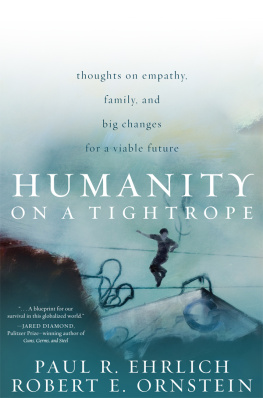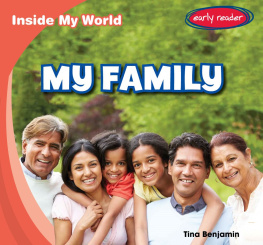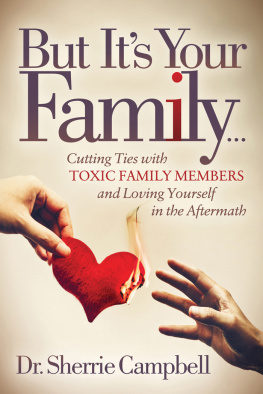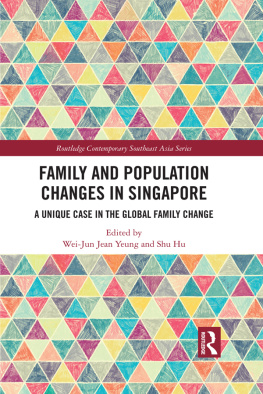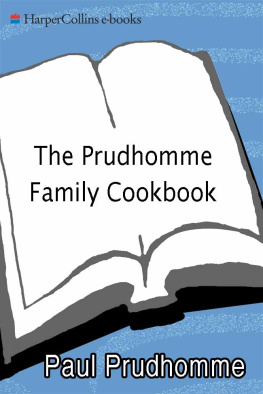part I
Connecting
with Others
The Evolution of Humanity,
Families, and Empathy
chapter 1
On a Tightrope
H ave you ever gone to the circus? Next time, watch closely the person on the tightrope trying to keep her balance. Notice what happensyoure grimacing, relieved, apprehensive, relieved again, hopeful, grimacing, and so on. Then look around; everybody else is tensing their muscles, moving left to balance while the tightrope walker tilts right, feeling apprehensive, then relaxed, tense again, sighing in relief when balance is regained. You are, automatically, feeling an intense connection and empathy with a stranger.
The need to expand our connections and cooperation with strangers is essential right now. All of us, citizens of every nation, are now in the same family, are now in the same boat, walking the same tightrope, like it or not. The worst problems of the human predicament are common to all of us, from climate disruption, loss of biodiversity, and poisoning of the environment to pandemics, gross economic inequities, and the threat of nuclear war. Our tightrope is a line from humanitys past to its future.
Like it or not, were all now balancing on that same global tightropeand that means we have to change our behavior.
Weve got it in us to change. All human beings have a brain that evolved to give us an extraordinary ability to understand and to connect with others, but that primordial ability is much too limited for the complex world that weve created in the twenty-first century. Our global civilization is facing new and unprecedented challenges from many intractable problems. Daily we read about these dismal prospects, and it seems theres little we can do about them: climate disruption can cause increased starvation, and rising seas will generate crowds of refugees; there are new and scary pandemics, and toxic chemicals threaten health; there are large and small wars, discrimination, exploitation, gang rule, torture, economic inequality, and on and on. But there is a lot that can and should be done regarding our predicament; its time for big changes.
Of course, theres no simple, quick, and easy solution to make it safely to the end of the tightrope, to create a human society that is both sustainable and equitable, although many different solutions have been proposed. In the climate dilemma, these solutions range from simple things like lowering the planets heat by painting roofs white in hot climates, to complicated and probably unworkable ones such as the formation of a world governing body that could control the energy economy of all nations. However, in spite of there being no easy answers, many more people could become aware of two closely related human characteristicspatterns of family affiliation and the capacity to empathize.* With this awareness, many people might be led to change their behavior, as well as that of the global community, so that environmental catastrophe might possibly be averted.
One of our societys major problems is that there is, as Barack Obama said in his Martin Luther King speech in 2008, an empathy deficit. Most people dont relate to a broad enough part of humanity. Were often unable to get into their shoes, to share their feelings, to understand their emotions. Empathy and sympathy are related but are not the same. Empathy is the ability to understand emotionally anothers feelings and experience; we have empathy with someone. Sympathy means approving of another persons state or feeling the same; being in accord with them. We generally feel sympathy for someone. It is, however, difficult to feel sympathy for a person without some empathy. One can empathize with an individual reacting to, say, great provocation with an act of violence without being in accord with the action.
One hopeful sign for promoting change is the new understanding of how the human brain operates; were not, as it turns out, just simple economic men, cold-blooded rational decision makers. Out go the old models of connecting switchboards or computer-like structures. Instead the human brain/mind is highly influenced by the emotional tone of any situation, and emotions are essential to decision making. And it is the empathetic emotions that are falling short right now.
And that empathy shortfall costs more than just a loss of emotional closeness. It affects how we see ourselves, our family members, and the others in our immediate life. It also affects how we see our nation, all the people of the planet, and all of the planets nonhuman inhabitants. Empathys genesis traces in part to our long evolutionary history as a small-group animala uniquely intelligent creature that associated with a few dozen to a few hundred closely related creatures, all of whom lived in the same environment and had largely similar experiences and values. Empathy not only came naturally, it had natural limitsour distant ancestors in African forests and savannas did not ordinarily meet others with different worldviews. It wasnt until Homo sapiens left Africa and the species enormously increased its population, diversified culturally, and had contact with strangers that there was the possibility of an empathy shortfall. It is thus a relatively new development in response to our recent success as a species.
But now that the shortfall is here and well developed, eliminating it would be a first step, and to be sure, only a first step, to enable a new kind of world and aid a return to the family connectedness of our distant ancestors in Africa. This would be a human family reunion at a scale they could not have dreamed of.
We are not such a united family right now. Consider many peoples inability to care for the condition of the poor today, to say nothing of feeling concern for how climate disruption will affect not just their own children or poor people on a distant part of the globe, but future generations of our species. That disruption could damage agriculture and fisheries so much that the more than one billion people hungry now could become three billion or more. It is unlikely that the descendants of our in-groups, of our own families, no matter where located, could avoid the fall from the tightropethe mayhem and premature death that would result.
Why dont we register some of these possible civilization-ending threats? The costs of not acting now to lessen climate disruption could be extremely high, but we seem willing, even eager, to accept those costs rather than taking relatively inexpensive steps that would be beneficial even if the climate wasnt changing. Why dont we have more empathy for the people already hungry, and for the billions more who could well be hungry in a few decades? Why dont more people realize that if we dont pay increasing attention to our most inclusive family, the human family, the denouement for all will likely be horrific?
We dont think it will be easy to get more people to emotionally join a global family. But were writing this book because the first barrier to many if not most of the remedies for the human predicament is that we dont see the other people in this world as us, part of the same people, in the same family, in the same... boat.
So, whether it will be easy or not, we think it essential to try. Making changes in how we view all our different families, how we all see and how we care for others, could be the beginnings of the move to a more unified, equitable, and secure world. And some of the latest research in fields like cognitive science, social neuroscience, and anthropology provide promising keys to our looked-for cultural evolution.
There are immediate behavioral solutions to problems such as inadequate health care, climate disruption, and the use of environmentally faulty energy technologies. All could be ameliorated by relatively small changes in human actions. For instance, theres much argument about health care in the United States these days, focused on financial issues such as the reimbursement schemes, insurance policies, and the need to give people without insurance access to care.

